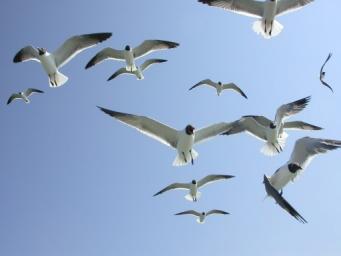The Gulls of Salt Lake
At last. They were safe. A brave little company of pioneers from the Atlantic coast crossed the Mississippi River. They finally succeeded in climbing to the top of the great Rockies and down again into a valley in the very midst of the mountains. It was a valley of brown, bare, desert soil, in a climate where almost no rain falls. But the snow on the mountain-tops sent down little streams of pure water, the winds were gentle. Like a blue jewel at the foot of the western hills was a marvelous lake of salt water, an inland sea. Some wanted to keep going. But most said, this is where we should live. So the pioneers settled there and built themselves huts and cabins for the first winter.
It had taken them many months to make the terrible trip. Many had died of illness on the way; many died of hardship during the winter. The supplies they had brought in their wagons were so nearly gone that, by spring, they were living partly on roots, dug from the ground. All their lives now depended on the crops they could raise in the valley. They made the barren land fertile by spreading water from the little streams over it, what we call "irrigating”. They planted corn and grain and vegetables. Every one helped, and every one watched for the plants to grow, with hopes, and prayers, and careful eyes.
In good time the brown earth was covered with a carpet of tender, green, growing things. No farmer's garden could have looked better than the great garden of the desert valley. And from day to day the little plants grew and flourished till they were all well above the ground. James, who was the head of the group, said, “We finally will have all the food we need.”
Then a terrible thing happened. One day, the men who were watering the crops saw a great number of crickets swarming over the ground at the edge of the gardens nearest the mountains. They were hopping from the barren places into the young, green crops, and as they settled down they ate the tiny shoots and leaves to the ground. More came, and more, and ever more, and as they came they spread out till they covered a big corner of the grain field. And still more and more, till it was like an army of black, hopping, crawling crickets, streaming down the side of the mountain. James said, “Watch out, they’re going to eat our food.”
Everyone tried to kill the crickets by beating them down, but the numbers were so great that it was like beating at the sea. Suddenly, from far off in the air toward the great salt lake, there was the sound of flapping wings. It grew louder. It looked like a white cloud rising from the lake, a flock of sea gulls flying toward them. Hundreds of gulls rose and circled and came on.
"The gulls! The gulls!" James cried. They have come to help. The gulls flew overhead, with a shrill chorus of whimpering cries, and then, in a marvelous white cloud of outspread wings and hovering breasts, they settled down over the field. “Look, look,” James said. “See! They are eating the crickets! They are saving our food.”
It was true. The gulls ate the crickets. And when at last they finished, they had stripped the fields of the crickets. The pioneers had moved to the right place after all. It had taken a lot of work. It had taken determination. They had met obstacles. They had solved problems. They would survive.
